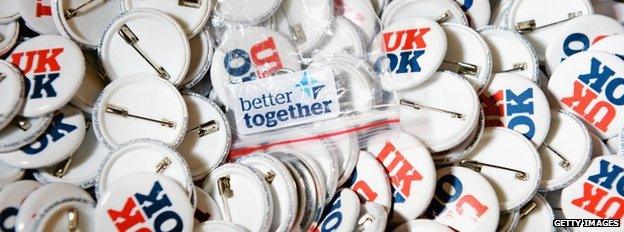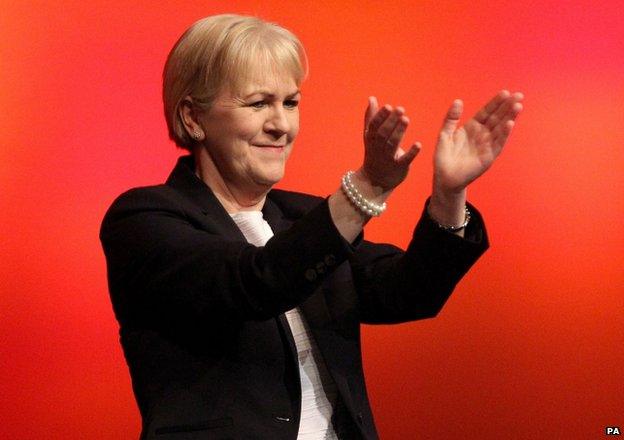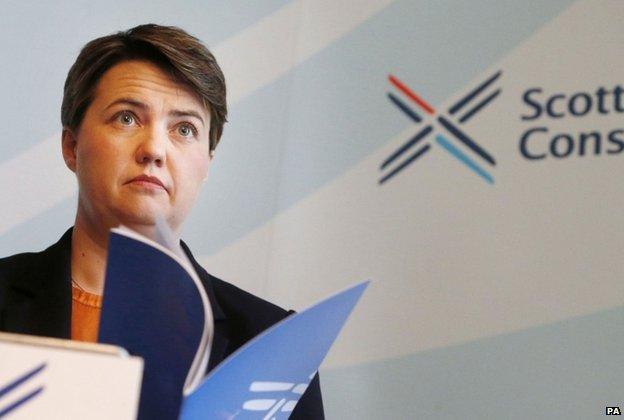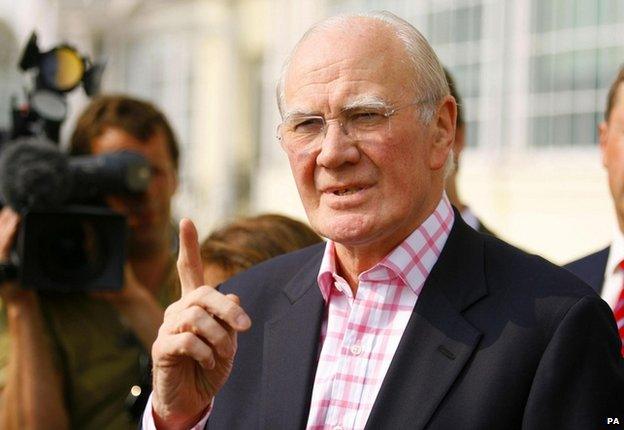Scottish independence: What new powers might Scotland get?
- Published

The pro-Union Better Together campaign comprises Labour, the Liberal Democrats and the Conservatives
Ahead of the 18 September independence, UK Chancellor George Osborne and former prime minister Gordon Brown have laid out plans to increase Scotland's powers in the event of a "No" vote.
The Conservatives' Mr Osborne has set out a plan of action on new powers, while Mr Brown, a Labour MP, said a vote for the Union would be the "starting gun" for Holyrood to be handed greater control over finance, welfare and taxation.
Their comments came after polling indicated a narrowing in the lead the Better Together campaign has over Yes Scotland.
Scottish Labour, the Scottish Conservatives and the Scottish Liberal Democrats, have also pledged to increase Holyrood's fiscal powers if Scotland votes against independence.
Each party has set out its own proposals, so what do they entail?

Scottish Labour

Scottish Labour leader Johann Lamont has backed further powers for Scotland's devolved parliament
Scottish Labour's devolution commission, external has backed increased tax-varying powers and control over some elements of welfare and benefits policy.
It said MSPs should be able to vary tax by up to 15p, giving them the option of restoring the 50p rate for top earners. They would also be able to cut the 45p rate but only if the basic rate was cut as well.
The plan would go further than 2012's Scotland Act, external, a piece of UK government legislation giving Holyrood the power to vary income tax by 10p from 2016.
The commission also said housing benefit should be devolved to Holyrood, allowing MSPs to scrap the UK government's controversial under occupancy charge, branded the "bedroom tax" by Labour and other critics.
It also proposed devolving the attendance allowance - paid to disabled over-65s - and the work programme, which manages services for the unemployed.
All other pensions and benefits would stay at Westminster, and there would be no powers for Holyrood over corporation tax, national insurance, VAT, capital gains tax or air passenger duty.

Scottish Conservatives

Scottish Conservative leader Ruth Davidson said she wanted to strengthen Scottish devolution
Scottish Conservative leader Ruth Davidson has said Scotland should be given full income tax powers, a key recommendation of the party's devolution commission, external, chaired by Lord Strathclyde.
The commission, which said the income tax plan would see the Scottish Parliament accountable for 40% of the money it spent, also said there was a case for a share of Scottish VAT receipts being assigned to the Scottish Parliament.
It recommended the tax-free personal income tax allowance should remain reserved to Westminster, but, after that, the Scottish Parliament would decide on rates and bands.
And it called for a new, independent Scottish Fiscal Commission to produce Scottish forecasts.
Elsewhere, the Strathclyde report said the Scottish Parliament should get responsibility on welfare issues which relate to devolved areas, such as housing benefits, and attendance allowance.
Launching her successful Scottish Conservative leadership campaign in 2011, Ms Davidson described further powers beyond the Scotland Act as "a line in the sand".
But her stance changed when she announced the commission, saying her party was "committed to a new path" of more Holyrood responsibility.

Scottish Liberal Democrats

Sir Menzies Campbell led a commission into the future of Scottish devolution
Under the Liberal Democrats' Scottish "home rule" vision, Holyrood would raise and spend most of its own taxes and borrow on its own terms.
Its commission, external, chaired by former UK party leader Sir Menzies Campbell, said the Barnett formula - used to work out Treasury funding to the UK's devolved areas - should be replaced with a "needs-based" arrangement.
Oil would continue to be managed at a UK level, as would welfare and pensions, defence and foreign affairs.
Under the plans, the Act of Union between Scotland and England would be scrapped and replaced with a declaration of federalism.